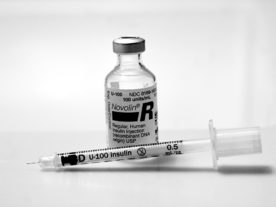For years, science has linked the saturated fats that can be found in red meats to cardiovascular disease.

Cross-sectional ultrasound images of coronary arteries from patients enrolled in the study. Plaque buildup (colored areas) in an artery from a patient that lacks sensitivity to red meat allergen (left) is much lower than plaque levels in an artery from a patient with sensitivity to red meat allergen (right). (Angela Taylor, M.D., University of Virginia Health System)
Now a new study published in the American Heart Association’s journal Arteriosclerosis, Thrombosis, and Vascular Biology suggest that sensitivity to an allergen found in red meat may also contribute to the buildup of arterial plaque in some people.
The new study is supported by the National Heart, Lung, and Blood Institute (NHLBI), which is part of the National Institutes of Health
Previous research identified the main red meat allergen as something called galactose-α-1,3-galactose, or alpha-Gal, which is described as a type of complex sugar.
The new study also found that the bite of the Amblyomma americanum or Lone Star tick can sensitize people to this allergen.
While scientists are unclear of the exact number of people who may have this meat allergy, the study authors estimate that in some areas it may be 1 percent of the population.
























Comments are closed.